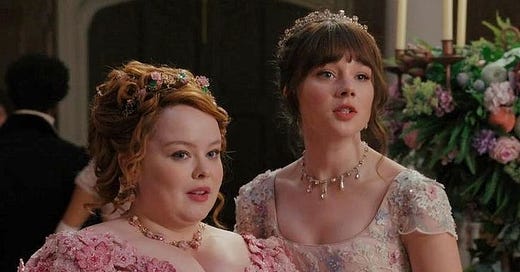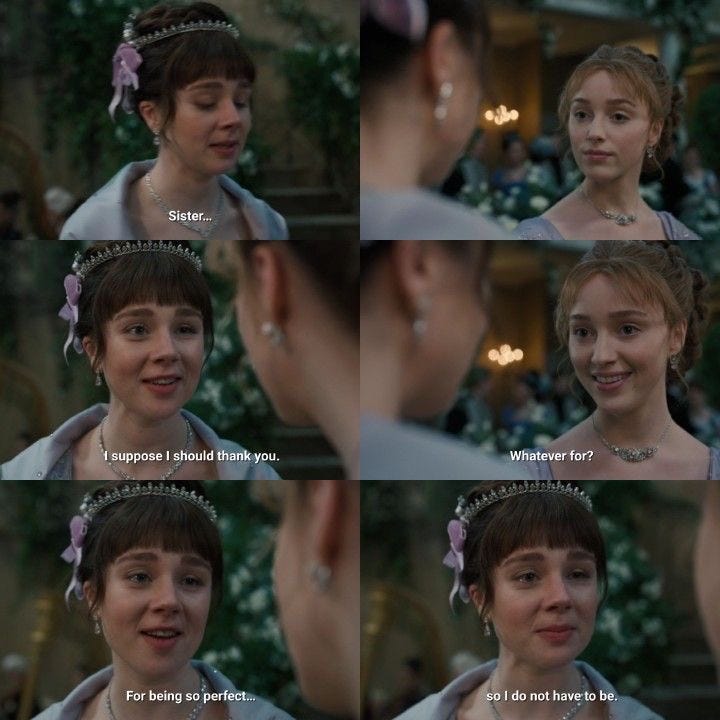Eloise Bridgerton and the illusion of choice feminism
the pitfalls of Individualistic Feminism
Eloise Bridgerton is the middle child of the late Viscount and Lady Bridgerton in the Netflix series Bridgerton. Known for her wit, intelligence, and non-conformist attitude, she often starkly contrasts the traditional societal expectations of her time. While she champions women's rights and dreams of a life beyond marriage and motherhood, her approach reveals certain hypocrisies that undermine her feminist ideals.
Progressive Traits
Why must my only two options be to squawk and settle or to never leave the nest. What if I want to fly” -Eloise Bridgerton
Eloise is undoubtedly a progressive character for her time. She openly criticizes the limited roles available to women and expresses a desire for education and independence. Her frequent discussions with her family and best friend, Penelope, highlight her belief that women should have more choices. Eloise makes it known to anyone who will listen that she has big dreams and believes a woman should be more than what society only considers her to be: a prospective wife and, later, a mother. “Why must my only two options be to squawk and settle or to never leave the nest? What if I want to fly” -Eloise Bridgerton
Critique of Privilege
Eloise has no desire to marry and would prefer to pursue educational pursuits. That in itself is not inherently wrong it’s the way she expresses her desires and her perception of women who do not share the same ideologies as her
Her progressive stance is often marred by her lack of awareness of her own privilege. Coming from a noble, aristocratic family- a fancy way of saying she was pretty loaded- Eloise has the familial financial and emotional support to pursue her dreams. A privilege not shared by many women of her time, who see marriage as an economic necessity. Eloise's dismissive attitude towards traditionally feminine pursuits shows a lack of empathy and understanding for those whose desires differ from hers.
Instead of acknowledging her privilege and potentially using it for good—given that she likely receives a sizable allowance from her family—Eloise often positions herself on a high horse, looking down on other women who have different desires and opinions. She never misses a chance to belittle other women's interests, whether it's sewing, fashion, or marriage, as she would much rather spend her time on pursuits she deems more worthwhile.
This is seen in several scenes throughout the series. Her sister, Daphne, is not spared from her judgment. Eloise can’t fathom that some women might genuinely be interested in marriage or having a family. She always makes snarky remarks when Daphne seems to enjoy her debut and all that it brings. A scene that stands out is when Daphne plays the piano, and Daphne lets Eloise know she should practice her piano skills. And in response, Eloise boasts about the superiority of her reading over Daphne's pursuit of a husband. This happens in Season 1, Episode 3
In Season 1, Episode 4, Daphne tells Eloise, "You do know I'm setting the standard for your future matches. Yes, you should be grateful." Eloise dismisses her by saying she’s not like her and never will be. Eloise cannot see that Daphne, as the older sister, is burdened with the familial responsibility of marrying well to set a precedence for her younger sisters.
True feminism is not about individual or collective choices but about collective liberation
Daphne’s desire to be a wife is just as valid as Eloise’s desire to remain unmarried. However, Eloise's main issue transcends Daphne. True feminism is not about individual or collective choices but about collective liberation. And in that liberation is the gift of choice, choices which do not come back to bite you and threaten you with social ruin and scorn.
Other ladies don’t have the privilege to desire anything but a husband. Eloise’s family is wealthy; if she chooses to pursue education, her brother will see that a teacher will be at their door the next morning. Although she might not be allowed to attend university, as only men are permitted—which, to be fair, she has a right to be upset about— she has a supportive and, most importantly, wealthy family.
Eloise: "Suppose I desire something different"
Benedict: "How do you mean?"
Eloise: "Just different. I watch Daphne prepare for these balls with all of those dresses and the many suitors, and I am exhausted.
Suppose I want a different life, that I truly believe I am quite capable of something more, even when I am not allowed to have anything else."
Benedict: "Then I would say... that you're not the only one."
Eloise also has the privilege of finding a love match, while other ladies have no choice but to need a husband and are lucky if they find a polite one. She focuses too much on what she cannot attain rather than what she already has. I wonder if she had access to everything she wanted, could she then see the stark disparity between her and other ladies, whether they were of the ton or not? Or she’d be just as unaware and judgmental as she is now, mocking the other ladies' interests in needlework. How dare a lady polish herself for a potential suitor in a world where a glimpse of freedom is achieved at the hands of a man and, in their case, a husband?
That’s one of the few choices society awards them—the choice of whom to marry. Well, for most of them, at least. If your family were kind enough, then you’d get to choose. If you weren't fruitful in the marriage market, or the head of the household decided to marry you off to some old cruel man, then so be it. A fate that actually befell Cressida Cowper, Eloise’s Season 3 friend, and Eloise could not truly sympathize with her but, in fact, undermined her intelligence when she comes up with a way out of her predicament with little help from Eloise. Eloise was too concerned with her less damning problems to care—a trait she has had for a while. Even in Season 1, when she was friends with Penelope, she was somewhat conceited. She mostly talked about herself.
That’s why it took her that long to unearth that Penelope was Lady Whistledown; she never really listened. There's an episode where she said she truly heard her for the first time. Hence, it didn’t surprise me when she thought Penelope also wanted to be a spinster and was shocked she wanted a husband because she never really listened. Penelope desired to be wanted; she did not like being perceived as “an insipid wallflower.” She never said she wanted to be unmarried. Eloise was the one obsessed with that. Yes, Penelope did desire freedom, but Eloise simply ignored her friend's wants. This leads Penelope to get angry at Eloise when she continuously goes on and on about unmasking Whistledown. Penelope tells her she has other “mature” stuff to worry about. Was she a little rude? Yes. Was Eloise being annoying and a little selfish? Maybe.
Which goes hand in hand with what Daphne told Eloise. “You are not the only one with troubles, Eloise” (Season 1, Episode 3). Eloise shares her valid fears about marriage and especially childbirth, which stem from a probably traumatic childhood experience where her mother could have died. Daphne tries to share her perspective of there being a brighter side since that experience brought about little Hyacinth. Eloise completely dismisses her opinion and says she’s pretending.
In as much as Eloise is a refreshingly progressive character, she has some flaws in how she communicates her rebellion against society (she lacks compassion and self-awareness). She fails to acknowledge her privilege and that other women are victims of societal expectations as well. Lack of choices is not the main problem but rather the lack of freedom. However, I think that leaves room for growth, as all Bridgerton main characters have a growth arc during their season. I will be sat when it comes out
Thank you for reading, feel free to share your thoughts in the comments.







Eloise is the classic case of feminism without intersectionality. She means well, but she doesn’t realise her privilege shields her from the struggles most women face. Her constant judgment of other women for not rebelling is ironic, considering she’s only able to rebel because of her wealth. Honestly, I can’t wait to see her growth arc, because right now, she’s giving pick-me feminist energy.
I love this piece!!